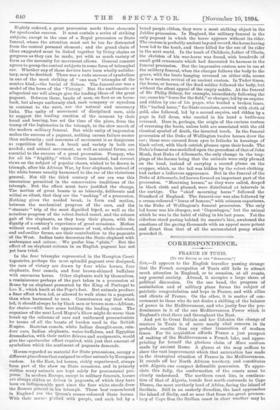CORRESPONDENCE.
FRANCE IN TUNIS.
[To THE EDITOR OF THE " SPECTATOR." ]
SIR,—It appears to the English traveller passing strange that the French occupation of Tunis still fails to attract much attention in England, or to occasion, at all events, any general anxiety. Abroad, it occupies a large share of political discussion. On the one hand, the progress of assimilation and of military plans forms the subject of patriotic congratulation and hope in France, and with allies and clients of France. On the other, it is matter of con- cernment to those who do not desire a shifting of the balance of power in the Mediterranean, and who justly fear the pre- dominance in it of the one Mediterranean Power which is England's rival there and throughout the East.
And yet to Great Britain and her Colonies the change of masters in Tunis is of more nearly vital concern in its probable results than any other transaction of modern times. For its acquisition affords France a just prospect of making of the Mediterranean a French lake, and appro- priating for herself the glorious claim of Mare nostrum, made by ancient Rome. A glance at the map suffices to show the vast improvement which that annexation has made in the strategical situation of France in the Mediterranean. It rounds off her North African territory, and constitutes with Algeria one compact defensible possession. To appre- ciate this fully, the conformation of the coasts must be clearly understood. The northern coast line, in continua- tion of that of Algeria, trends first north-eastwards to Cape Blanco, the most northerly land of Africa, facing the island of Sardinia. Still in an easterly direction, the land approaches the island of Sicily, and so near that from the great promon- tory of Cape Bon the Sicilian coast in clear weather may be made out. From that point, abruptly the coast-line breaks off -eastwards, and descends two hundred and fifty miles directly south, there meeting the coast of Tripoli at about a right angle. Tanis is thus a land projected forwards from the African Continent into the Great Sea, as a huge barrier ; forming, at the same time, the eastern basin of the Mediterranean, whilst on the north it constitutes, with the island of Sicily, -a wide strait or ocean-pass between the eastern and western halves of the Mediterranean. The significance of the Tuni- sian acquisition lies in that pass, which, by the Naval Power possessing the coasts and harbours, may in war be blocked; and the essence of the prize thus won by France consists precisely in its extent of seaboard, and the number of great harbours,—harbours the most valuable of all on the southern shores of the Mediterranean. For the French had hitherto possessed no good harbours in their North African territory, the coasts of Algeria being steep and rocky, offering nowhere good anchorage-ground for large ships and no sheltering ports. That deficiency in Algeria, and the tempting prodi- gality of natural harbours in Tunisia, were the motives of the expedition of 1881-2, which, under pretext of chastising some frontier Kabyles, accomplished the subjugation of the Bey's dominions. That scheme had been so well devised, and carried through with such celerity, that, whilst the first official notice of warlike operations was made on April 4th, 1881, the expeditionary corps had, by June 4th following, occupied the city of Tunis, and extorted from the Bey the -cession of his sovereignty to France. The Tunisian people -declined to give in their submission with that of the Bey, -and the country had to be conquered in detail. But as the
most important strong places were the East Coast towns, they were speedily reduced in a mere naval promenade. Thus fell Tunis at a blow, from independence to the condition of a Colony of a foreign Power, the ex-Sovereign remaining -the nominal ruler on a pension from the French. His resi- dence even has not been spared. The ancient edifice of the Bardo has been demolished, and replaced in great part by structures without originality other than ugliness. Those who knew the palace under the Regency, are unanimous in protesting against the barbarous transformation by a civilised Power, of a precious relic of the best days of Islam. The Minister of Public Instruction sent his agents from Paris to econvert the old Harem into a museum, and Rococo now reigns in the halls of the Khalifs—not without some reprobation.
It seems wonderful that the other Powers looked on unmoved -at this aggression, and that the Sultan himself supported with patience the extinction of his Suzerainty, which had lasted three hundred years. Towards the close of the nine- teenth century, we see a country overrun and annexed without having given provocation, without even a quarrel,—a country not somewhere beyond the notice of civilised nations, but in view of one of the most frequented maritime highways of European commerce.
On this great occasion England and Italy, although their -statesmen must have foreseen the disastrous results in a near future, took no measures to avert the consummation of the -conquest, as they might have done without serious risk, by -affording some countenance to the struggles of the popula- stion. By allowing the nation to be crushed and subjugated, and by recognising France in substitution of the Beylical Power, they assisted in altering the balance of power, to their own fatal disadvantage, in the Mediterranean. France, on her side, lost no time in developing the great succession which her -audacity had wrested from fortune. She first, in the naval -operations which completed the conquest, consolidated her position on the long stretch of the East Coast of about two hundred and fifty miles, from the vicinity of the Island of Sicily running nearly due south to the frontier of Tripoli. That coast is studded with harbours,—Hammamet, Sousse, Monastir a fine anchorage, Sfax, Mahedia, Gabes, and Jerboli -capable of becoming one of the grandest harbours. The importance to Great Britain of the transfer of this coast from a feeble Power, the Bey of Tunis, to that great nation which, infinitely her superior in military strength, bleeds at every -pore in the effort to rival her as a naval Power, lies in the fact of its facing the island of Malta. It was through those -harbours that Rome drew her supplies of corn and produce from her African province ; and that Byzantium, in succession 'to Rome, carried on a vast intercolonial trade. Temples, arches, tombs, bridges, all have left behind their inscriptions to Omar, Trojan, the Antonines, and Justinian, and serve to identify the great granaries and entrepots of the colony. Sousse is thus proved to be the famous Hadrumetum, the theatre of Hannibal's operations against Scipio, and of the civil war which put the African province into the power of Cmsar. It became the great port of exchange between Europe, Asia, and Africa, and was the capital of that province which was carved out of the Proconsular domain by Diocletian. It was the field of battle on which Belisarius overthrew the kingdom of the Vandals in 535. Against Islam it held out long, with the aid of the troops of Byzan- tium; but in the forty-fifth year of the Hegira (A.D. 666) it fell, and the whole province with it, under the Mahommedan yoke. Exterminating wars, followed by three centuries of a retrograde Turkish rule under the Boys, had ruined the trade, together with the ports, of the coast. Under the French, these ports are to become again world-famous. The administration is throwing immense energy into the enterprise of resuscitating the vitality and prosperity of this East Coast ; deepening the harbours, building moles and jetties, and especially military works and docks for large steamers and war-ships. There are already lines of steamers to La Goulette-Tunis, Leghorn, and Messina. Sousse is again a new port, and the entrepot of the forests of olive-trees and of the vast cornfields of the central plains. A grand scheme of railways for the whole land is in course of execution which will connect the ports with the capital, with the holy city Kairouttn, and with the other large interior townp, some of which are already in connection with the Algerian railway system by the north coast. These eastern ports must thus recover their ancient importance as entrepots between the Levant and Western Europe, as well as outlets for the country's own productions. Nothing more startling can be imagined than the poles and wires of the telegraph
over the Tunisian solitudes, in contrast with the tents of the children of the desert barely emerging from savage life.
This policy of European development, under favour of durable peace, must bring forth the vast treasures and reserves of Nature in a land which is only not rich because during ages desolated by wars or restrained by unenlightened government. It will again become one of the world's finest granaries. It possesses, moreover, virgin mineral deposits. In the part of the land that is, as to the surface, the least promising, there is a vast deposit of natural Phosphates which are not to be found elsewhere on the globe, and sufficient for the wants of mankind. This alone is a richer field than the South African diamond loam ; and awaits the overflow of the enterprise and capital with which Europe fertilises the earth, to become one of the fairest gems of France.
But the urgent international interest in the Tanis territory, considered as it is by the French as a part of France, turns on its strategical importance in relation to other Powers who have possessions and vital concerns in the Mediterranean, and especially on the magnitude of its naval stations. For Italy clearly it must be, in the event of a quarrel, a life-and-death risk. And in Great Britain, the instinct of self-preservation should not remain unaffected by a presentiment of danger. The guides of national opinion and feeling would assuredly be culpable in hiding from. the people and from Parliament that which they know, or should take the pains to learn, of this new situation which profoundly modifies the conditions of supremacy in the Mediterranean. Evidently, it is not alone by a comparison of classes and number of ships that the naval strength of nations is to be judged. If your adversary has a great position, a whole country, facing every way by which it is necessary that you should pass, he may well have fewer ships than you without relative disadvantage. The East Coast of Tunis faces Malta. The fleets which the ports might in war accommodate, would be menacing it, would keep up a great strain of peril and alarm, would intercept supplies and check reinforcements. The coast would offer a convenient champ de manoeuvres, a base of operations, against the fortress of Malta.
At the same time, the North Coast presents a change of circumstances of still graver peril, since the fall of the Beylical Power. At the extreme north of the State, under the shelter of the far-stretching promontory Ras-el-Abiad (Cape Blanco), the French are founding a Mediterranean Portsmouth. With this new territory there has fallen to the lot of France an extraordinary natural landlocked harbour, of enormous extent; a harbour destined to become one of the most frequented of commercial ports, and probably the grandest of dockyard harbours in the Mediterranean, if not in the whole world. Protected by the two protnontoties, Ras-el-Abiad and Ras Zebib, the deep bight now known as the Bay of Biserta, was, long prior to the Christian era, one of the best-known havens of the Great Sea. Its name was Hippo-Zarytus, not to be con- founded with another Hippo whereof St. Augustine was Bishop, which is the modern Bone in Algeria, and was Hippo-Regius. The wonderful feature of the port is its vast inland waters. These are two great lakes or natural basins, connected by a deep channel with the sea and with each other. Here we have more than fifty square miles of water deep enough for the largest battleships, in every part free from sandbanks, shoals, and cliffs. A harbour much more than capable of accommo- dating the Mediterranean Fleet at one time, with secure and sufficient water-space for coming in and manceuvrmg, and per- fect anchorage everywhere. Under the Beys, the place had been wholly neglected—as indeed it had for a thousand years before, ever since the Hegira and the Mahommedan Conquest —and gone down to the condition of a ruined fishing-village. But as soon as the French Parliament got it fairly into their hands, by the consent of the other Powers to the annexation of the country, they resolved to apply largely the national resources to turning to the utmost account the prodigious capacities of Biserta. Millions of francs were voted, in suc- cessive years, with the intention of creating in Africa a second Toulon. The configuration of the Bay lent itself to the suc- cess of the engineers' projects. The new port, now completed, comprises two jetties, carried out into deep water 1,200 yards; and then a tidal harbour covering 225 acres. Then comes the channel between the outer harbour and the inland lake,—a channel excavated to afford an ample depth of water for battleships and the largest mercantile steamers, the width being 110 yards. There are quaya and wharves, along which ships that do not require the inner harbour may lie to discharge and load on or from the railway. The first lake, named Tindsha Binzerte, is the Hipponitis Palms (or Lavas) of antiquity. Bin zerte is probably the Arab corruption of the classic name " Zarytus." The second is a sweet-water lake, the Sisara of the Roman times. These two vast basins have been dredged and deepened, and are in reality and on an immense scale floating docks. The supple- mentary works and constructions appertaining to the numerous establishments in a dockyard, though pushed on with energy, must yet be the work of years.
The harbour military works have not been neglected. Formidable batteries have been mounted in the Bay ; and this more ominous business has even attracted the attention of the Italian Government, between whom and the French Foreign Office some explanations have passed. Italy's ob- jections arrive rather late in the day. For four or five years she has been an attentive spectator of the progress of the Biserta resuscitation, and has assuredly not missed the sig- nificant omen for her own security. It is evident that, after the completion of the Biserta port militaire, with its com- plete naval establishment, coaling station, and Fleet, no caramercial shipping without the permission of France will exist between the two Toutons ; and that in war nothing less than a great Fleet could run the gantlet of that tre- mendous pass. At the same time, the greatest fleet that France could assemble would lie, safe and snug, in their land- locked berth, drawing boundless supplies from the richest of lands. They issue forth ; they fight a battle ; those who return have not far to run to refit and be set up anew with vital force for ship and man.
The town and harbour are connected by railway with the Algerian system, and also, in the opposite direction, with Tunis, which is about forty miles distant. Biserta will eventually be the grand terminus of the two colonies. It is encircled with olive-clad hills. Its tobacco is excelled only by that of the Havannah ; plantations of almonds, figs, lemons, and oranges abound ; and the cotton-plant was culti- vated with success when called for during the American Civil War. The contrast of enlightened rule under the Pro- tectorate to the anarchy, oppression, and waste of the Beylick, is maniftst at every step. France may justly take pride in her work of transformation of that poor Tunisia,—when she took ft, ruined, depopulated, and brutalised ; now prosperous, tranquil, and free.








































 Previous page
Previous page